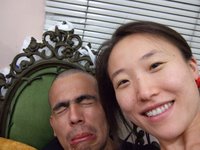 I descended upon Caracas at night. As our plane approached the landing strip, we flew over apartment towers lit up like architecture models; to my left was the silhouette of the sea; to my right were shadows pressed against the sky that turned out to be mountains.
I descended upon Caracas at night. As our plane approached the landing strip, we flew over apartment towers lit up like architecture models; to my left was the silhouette of the sea; to my right were shadows pressed against the sky that turned out to be mountains.I came to Venezuela to attend the wedding of Ramón, Carlos’s cousin. Carlos was born in Caracas and spent his first 11 years here; Ramón was more like a brother than cousin. I had also hoped to travel around a bit since Angel Falls, the world’s tallest cataract, was here and a poster at the airport, which proclaimed Venezuela to be the Caribbean’s best-kept secret, piqued my interest (and as it turned out, it will remain a well-guarded secret to me).
The drive from the airport (just outside city-limits) into Caracas, with tall mountains and windy roads, recalled memories of San Francisco. Carlos’s cousins, Ramón and Angel, were sure I would revise my opinion in better light. They were right.
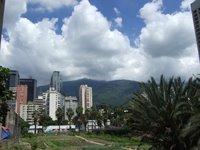 On the one hand, Caracas was spectacular. The city was nestled in a valley. Turn in any direction and you will encounter enormous mountains. Not just a pretty view, these mountains imposed their full magnificence and magnitude. To see them was to feel a punch in the gut; they were painfully and violently beautiful. I felt like I had fallen into a deep, wide well. And when I looked up, the sky and the clouds were always always the bluest blue and the whitest white. Despite the pollution, the firmament was sempiternally flawless.
On the one hand, Caracas was spectacular. The city was nestled in a valley. Turn in any direction and you will encounter enormous mountains. Not just a pretty view, these mountains imposed their full magnificence and magnitude. To see them was to feel a punch in the gut; they were painfully and violently beautiful. I felt like I had fallen into a deep, wide well. And when I looked up, the sky and the clouds were always always the bluest blue and the whitest white. Despite the pollution, the firmament was sempiternally flawless.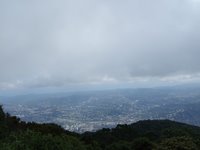 Unfortunately, when I looked down, at the ground beneath my feet, all I saw was dirt and trash. What nature bequeathed, a jewel wrapped in verdant, fragrant mountains and capped with cobalt and milk sky, the citizens of Venezuela had gorged and transmuted with the foul bile in their foul bowels, farting petrol that stings the eyes red and blind, excreting litter that contaminates the spirit senseless. There should be a sign to curb the citizens of the waste of their cheap industry and purge their diseased arteries infected with filth and fear.
Unfortunately, when I looked down, at the ground beneath my feet, all I saw was dirt and trash. What nature bequeathed, a jewel wrapped in verdant, fragrant mountains and capped with cobalt and milk sky, the citizens of Venezuela had gorged and transmuted with the foul bile in their foul bowels, farting petrol that stings the eyes red and blind, excreting litter that contaminates the spirit senseless. There should be a sign to curb the citizens of the waste of their cheap industry and purge their diseased arteries infected with filth and fear.On December 3, Venezuelans will vote. Watching Hugo Chavez campaign for reelection was like watching a rock star. Women swooned and men screamed in his presence. Hugo was very talented. He carried passion in his voice when he spoke about socialism and fomented nationalism.
One of Chavez’s campaign slogans was “Vote against the Devil. Vote against imperialism.” Despite the rhetoric, there were more McDonald’s and Burger King franchises per square mile in Caracas than Starbucks’s in Manhattan.
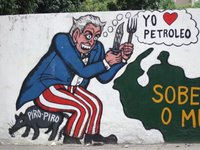 Tourism had not been well developed in Venezuela because it was perceived as another way for wealthy foreigners to exploit the country. That was why I didn’t travel outside of Caracas. A 2-night, 1.5-day trip to the mountains (including only breakfast, transportation to and from the airport, and one tour) cost $550. To backpack as a single female was strongly discouraged because of safety issues.
Tourism had not been well developed in Venezuela because it was perceived as another way for wealthy foreigners to exploit the country. That was why I didn’t travel outside of Caracas. A 2-night, 1.5-day trip to the mountains (including only breakfast, transportation to and from the airport, and one tour) cost $550. To backpack as a single female was strongly discouraged because of safety issues.Security was a tangible absence in Caracas and a source of anxiety that permeated every aspect of routine: driving, walking, entering a home, snapping a picture…
Some examples:
- A red light at an intersection (when there were lights at all) served only as a friendly reminder. I was told that there were no speed limits on the highways and no laws governing drinking and driving.
- After 21:00, the streets were deserted. My hosts constantly watched over their shoulders, vigilant against drunkards, thieves, and car-jackers.
- To enter or leave a residence, it was typically necessary to bypass a minimum of five locks. There was at least one main gate (sometimes two or three), one gate in front of the door to the apartment, and at least two locks (usually three or four) on the main door.
 When I took a picture of a demonstration in front of the presidential palace, a large, armed soldier approached me and threatened to confiscate my camera. Finally, I acquiesced by deleting the objectionable pictures in his presence. (However, after he left, I secretly took more photos.)
When I took a picture of a demonstration in front of the presidential palace, a large, armed soldier approached me and threatened to confiscate my camera. Finally, I acquiesced by deleting the objectionable pictures in his presence. (However, after he left, I secretly took more photos.)
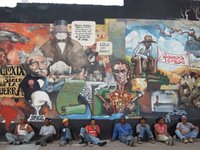 Yet, beneath the grime, dilapidation, and restrictions is unequivocal potential. Just look at the murals that line the city, created by artists of extraordinary talent. Like everywhere else I’ve visited in South America, the resources (natural and human) exist—in abundance. Nationalism as a palliative for poverty and suffering is inadequate. Pride is justified, but it must be followed up by positive works, constructive exploitation, scrupulous management, and moral leadership.
Yet, beneath the grime, dilapidation, and restrictions is unequivocal potential. Just look at the murals that line the city, created by artists of extraordinary talent. Like everywhere else I’ve visited in South America, the resources (natural and human) exist—in abundance. Nationalism as a palliative for poverty and suffering is inadequate. Pride is justified, but it must be followed up by positive works, constructive exploitation, scrupulous management, and moral leadership.Oh, and the wedding. It was a lovely, intimate gathering of family and friends. The ceremony was solemn and the party afterwards was rockin’.
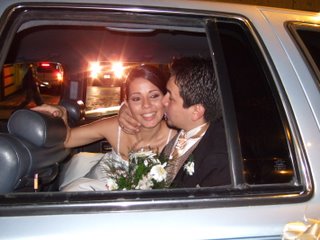
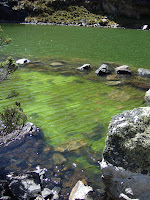
No comments:
Post a Comment